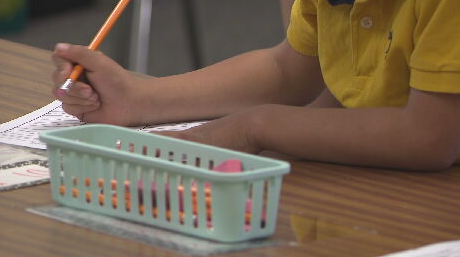DUBLIN, Ohio (WSYX) — Dublin City Schools has more mental health specialists this school year than ever before.
“As an educator in the classroom, I, over the years, have seen the increase in the need, the increase in behavior, the increase in the need for resources,” said Julie Fouche, a licensed social worker and mental health specialist for Dublin City Schools.
To help meet those needs, the district more than doubled its number of mental health specialists from last school year to this school year.
“For us to be able in real time, in a school setting, to bridge that gap is really important,” Fouche said.
While Fouche is one of the district’s new mental health specialists, she’s not new to the classroom.
“I’ve always believed in and felt mental health was so important, even when it wasn’t talked about as much as it is now,” she said.
After teaching for more than 20 years, Fouche is serving students in a new capacity. Two years ago, she enrolled in a first-of-its-kind initiative for the district, the Educator-to-Social-Work Pathway Program.
“Dublin put the email out of, hey, we’re thinking about partnering with Ohio State to do this program, I was like, wow, this is really, really cool,” she expressed.
Dublin Schools leaders selected current teachers, intervention specialists, and other staff members to earn their Master’s in Social Work from Ohio State on the district’s dime. They graduated last spring and started working in the new roles this school year.
“It’s really been helpful to use the knowledge that I know, my background knowledge that I have to be able to help kids be successful in the classroom, and then kind of mesh that with the new knowledge that I have around mental health,” Fouche said.
22 people graduated from the program. Dublin Schools already had 18 mental health specialists. The district now has 40 mental health specialists. Every school has at least one mental health specialist working there five days a week.
“We’re all very fortunate to be in our building five days a week,” said Morgan Lushinsky, a mental health specialist for the district. “There’s other districts where you might have two or three or four schools.”
Lushinsky said being present for kids 5 days a week creates positive changes.
“You can get the students that will ask for that break or say, I need to go see Miss Morgan. And that’s kind of a big win for me,” she said. “You’re using your words, so let’s honor those words.”
When kids are not in the classroom, Lushinsky said, there are signs parents and guardians can look for revealing that they need extra support.
“The big, drastic changes,” Lushinsky said. “If you have a really outgoing child and then all of a sudden they’re not, or even the flip side, your child was not outgoing and then all of a sudden they’re wanting to leave the house every day.”
“Being able to notice changes in your child is huge, and you can only know that really if you’re involved in your child’s life and creating a space that talking about feelings and feeling feelings is okay,” Fouche said.
They said connecting with kids can lead to eye-opening conversations and observations.
“I think social media has changed a lot, a lot of family time,” Fouche said. “It’s even parents, and I’m guilty of it, right? But parents getting off their phones and kids getting off their phones and really spending quality time of just connecting and finding different ways to connect, and it doesn’t have to be anything special. It can be a walk, a bike ride. And it doesn’t have to be deep conversations being had, but just kids feeling connected with their parents and parents feeling connected with their children, so they know when something is off.”

